|
Oak Hill
Woodnesborough
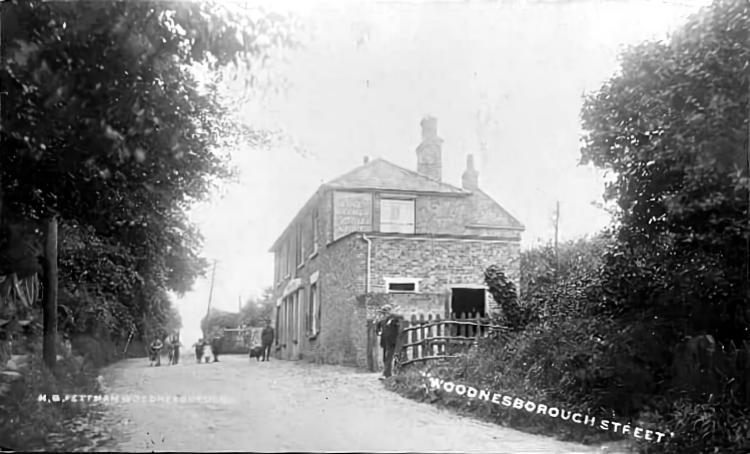
Above postcard, date unknown. |

Above photo, date unknown. |
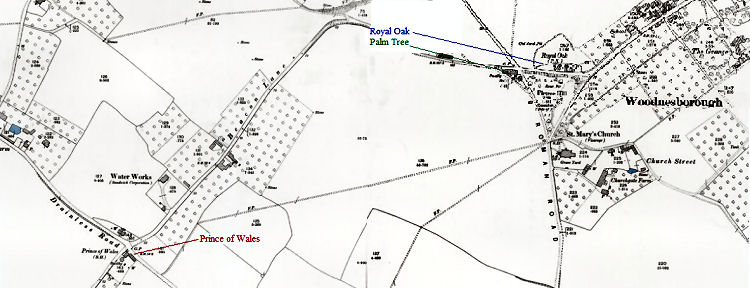
Above map 1896. |
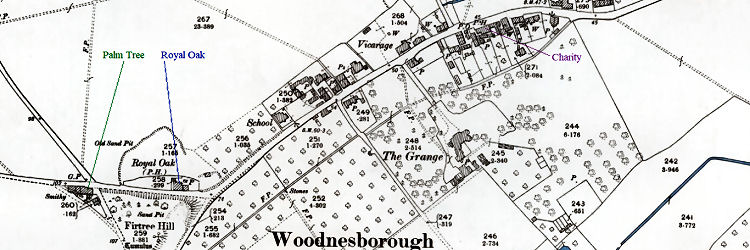
Above map 1896. |
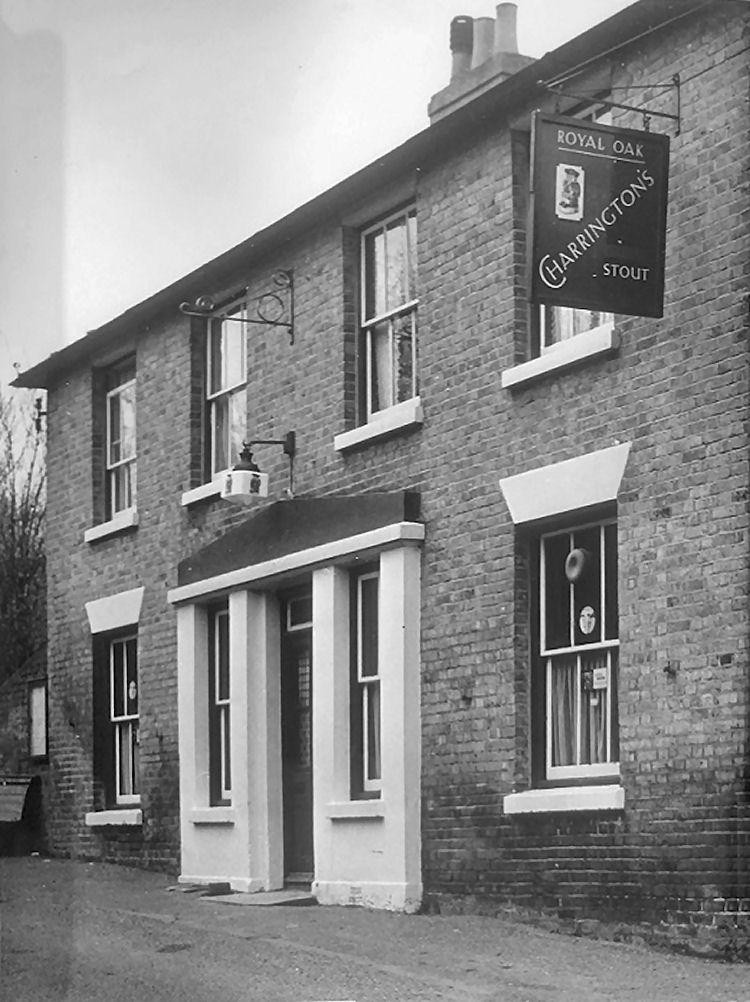
Above photo, 1954, kindly sent by Rory Kehoe. |
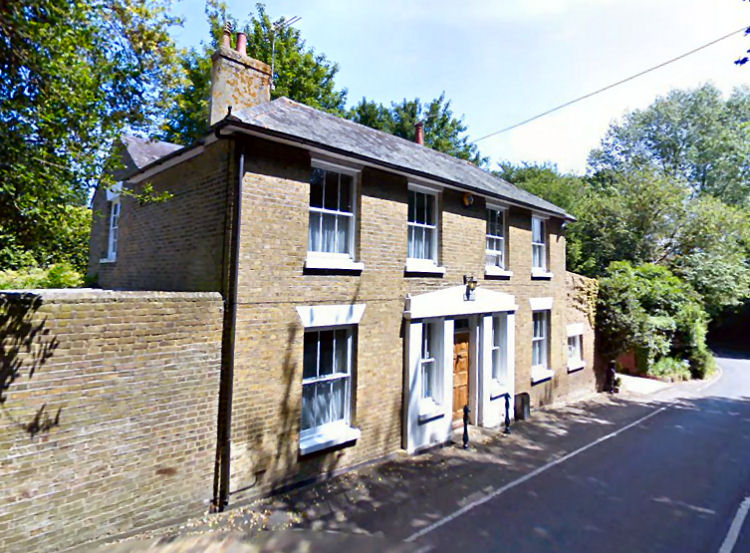
Above picture showing the former Royal Oak, taken from Google, July 2009. |

Above photo kindly taken and sent by Tonie Holt, 20 February 2013. |
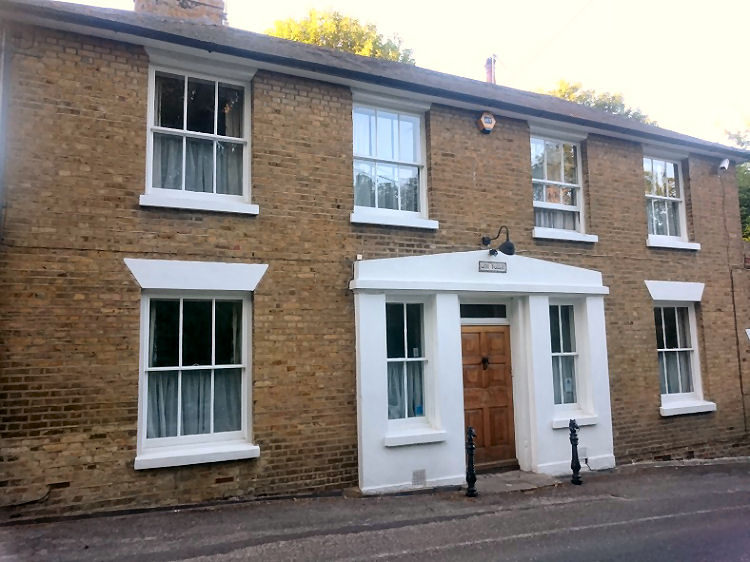
Above photo, kindly taken and sent by Rory Kehoe, July 2019. |
The 1914 Post Office Directory gives the address of a Royal Oak to be at
Woodnesborough. I haven't heard of this one before or since that mention and are
wondering whether they are mixing in up with another Royal Oak in another
village.
Then along come the 1882 Post Office Directory and it was mentioned again there
as Woodnesborough, Sandwich, so I am assuming that it is correct.
Well, finally found some more information in the Dover Express and East Kent
News, dated 14th July, 1939. The paper reported the following:- "Plans for
alterations to the public bar at the "Royal Oak," Woodnesborough, were approved.
|
From the Kentish Gazette, 30 January, 1773. Price 1½d.
To be SOLD publicly to the highest bidder.
On Thursday the fourth day of February, at two of the Clock in the Afternoon.
At the sign of the “Royal Oak”, in the Parish of Woodnesborough.
All that MESSUAGE, BARN, Stable, Garden, and Orchard; and also two
Pieces of Land, used with the same Messuage containing by Estimation,
six acres, more or less, situate, lying in the said parish of
Woodnesborough, near a Place there, called West Hamwold, and now or late
in the occupation of Francis Simmons, or of his assigns.
Further particulars may be had of Samuel Ross, Attorney, at Deal.
|
|
Southeastern Gazette, 26 July 1853.
Felonious Assault at Woodnesborough.
Edward Fagg, 18, William Fagg, 21, Edward Swains, 25, Richard Cart,
33, and John Bean, 22, were indicted, the latter for committing a
felonious offence upon the person of Mary Ann Bicker, against her
will, at Woodnesborough, and the four others with aiding and
abetting in the said offence. Mr. Horn prosecuted.
From the evidence adduced it appeared that the prosecutrix, a single
woman, was at the "Bull Inn," at Eastry, on the 27th June, and left
that inn between ten and eleven o'clock at night, in company with
two young men named Spinner and Jarvis, and a young woman named Jane
Whitmarsh. Prosecutrix walked with Spinner, and Whitmarsh with
Jarvis. When they came out of the inn they saw the prisoners
standing outside, who followed them. They then went into the "Bells" public-house, as they alleged, for the purpose of getting rid of the
prisoners, who, however, followed them about a mile and a half on
the rood to Eastry, till they arrived at the forge at Woodnesborough.
When they got there the prisoners began to assault Whitmarsh, who,
however, resisted them, and got away to the village, where she
aroused several of the inmates. They then, according to the
prosecutrix's statement, caught hold of her and threw here on the
ground. Four of the prisoners held her down, two of them holding her
arms and two of them her legs, while Bean committed the offence.
Jarvis had gone away and hid himself. Spinner also went away, saying
he did not like what was going on, but returned in time to se Bean
committing the offence, and accompanied her to the "Royal Oak" at
Woodnesborough. The prisoners followed, using very disgusting
language, and saving they would give her 2d. to get them a month's
imprisonment. When they got to the "Royal Oak" the constable, who
had heard cries of " murder," and several persons, had arrived. The
prisoners were violent and wanted to fight. The prosecutrix did not
then make any complaint, as she stated that she was too much
agitated.
The prisoners, in cross-examination and defence, endeavoured to show
that Bicker had been drinking with them at the "Bull" and "Bells"
public-houses for several hours, that she invited them to go with
them on the road, and gave them every possible encouragement to do
what occurred. Swaine denied having anything to do with her at all,
and Spinner stated that when he came back he was standing near and
not touching her.
The prisoners were all found guilty, and in sentencing them his
Lordship said they had been found guilty of a most abominable
outrage upon the prosecutrix, and although it was possible that she
might not be a person of very correct habits and morals, that was no
excuse for their committing such an offence of so unnatural a
character, and it was one in which no allowance could be made. He
then sentenced them each to twenty years' transportation.
|
|
From the Dover Express and East Kent News, Friday, 3 March, 1922. Price 1½d.
OBJECTED TO LICENSES RENEWED
The Magistrates set to hear objections to the renewal of licenses of
three licensed houses in the District.
The third house considered was the “Royal Oak,” Woodnesborough, and Mr.
R. Mowll appeared to ask for the renewal.
P.S. Martin said that the house was fully licensed and the tenant, Mr.
William Atwood had held the license since 25th August, 1883. The owners
were Messrs. Thompson and Son, and the tenant also carried on the
business of market gardener. The nearest houses were the “Palm Tree,”
beer house, 110 yards, the “Charity Inn,” fully licensed, 460 yards, and
the “Prince of Wales,” beer house, 1,270 yards. The population in 1911
was 970 and there were three fully licensed and two beer houses in the
parish. In his opinion the house was not required in the interest of the
neighbourhood.
Mr. Mowll: You have given us your opinion; did it proceed from a section
of the Bench?
No, it is my opinion.
Someone suggest it to you?
Not to me, but I went round with the Justices.
Witness, further examined said he was not aware of the feeling in the
neighbourhood over the suggested closing. He did not know that a
petition had been signed in the village including signatures from the
vicar, Mr. Baldero, Mr. Spratt and Mr. Cornes.
Mr. Mowll: Do you mean to say that the petition could have been got up
without you knowing anything about it. It seems that your private
enquiry department is not up-to-date, (laughter).
Miss Beatrice Atwood was called by Mr. Mowll and said that her father
had held the license for forty years, and her father and mother were
both over 70. She obtained the signatures to the petition.
Mr. Mowll read the petition which called attention to the long period
which the licence had been held without complaint, and that the licensee
was over 70 and depended on the house for his living. There were 170
signatures.
Lord Northbourne: What does the petition arise from. Do they think there
will not be sufficient beer to drink?
Witness: They think it would be hard on mother the father after being
there so long.
Amos Stokes, Ex-Superintendent of the Wingham Division said he signed
the petition. He had known the house and said for 15 years and it was
one of the best conducted houses in the district. He was satisfied it
would upset the public very much if the licence was taken away.
Lord Northbourne: You reside in Woodnesborough. Have you ever seen any
drunkenness there?
I am satisfied that in the last 15 years there has not been
half-a-dozen.
Mr. Baird: There are 10 houses for a population of 900.
No, I think it is five.
Lord Northbourne: If this house was shut would there be any less drink
drunk?
No, I think it would do away with competition, that is all.
Mr. Mowll: I think I am right in saying that there is a good deal more
accommodation there than at the “Palm Tree.”
Yes, much better.
Mr. W. T. Matthews produced figures as to the trade which he said was
increasing.
Mr. Mowll addressing the Bench said that he thought the case quite
unique. He had never heard of a house, conducted respectably and
properly for over 40 years, by the same tenant being questioned. He
ventured to ask what useful purpose was going to be served by the
refusal of the licence? He supposed that the object was to decrease
drunkenness, but if they had no drunkenness, they could not decrease it.
He thought it unfair to take away their license because there were too
many in the village, when the others were no better, and were not
questioned. He did not believe in attacking other houses, but Mr. Stone
had told them that it was a bigger house than the “Palm Tree,” and that
was not before them.
|
|
From the Dover Express and East Kent News, Friday 20
June, 1930.
PETTY SESSIONS
Dover County Petty Sessions were held at the Town Hall, Dover, on
Thursday, before Lord FitzWalter, Miss Bomford, Messrs.A. T. Goodfellow,
H. J. May, E. Hinds, A. M. Evanson, J. E. Monins, and W. H. Clark.
Long License Holders.
The license of the "Royal Oak" Woodnesborough, was transferred from
Beatrice Attwood to George Bullion. The license had been in the same
family for 49 years.
|
LICENSEE LIST
MARSH John 1841+ (only listed as carpenter age 45 in 1841 ) )
BUDDLE James 1847+
 (Also carpenter)
(Also carpenter)
BUDDLE John 1858+
OVENDEN Henry 1851-Jan/63 (age 23 in 1861 ) )

COCKS Richard Jan/1863+

FARRIER Henry Aug/1861+

NAILOR/NAYLOR John 1871-74+ (age 73 in 1871 ) )

HAMMOND Robert 1882+

ATTWOOD William 1899-Apr/25+ dec'd
    
ATTWOOD Beatrice V (widow and executrix) Apr/1925-June/30

BULLION George June/30-1934+

NEWELL Mr G F to July/1938

MATTHEWS Mr C G July/1938+

GIBSON Mr N C to Mar/1946

LEAVES Mr A E Mar/1946-61+

https://pubwiki.co.uk/RoyalOak.shtml
 From
Bagshaw Directory 1847 From
Bagshaw Directory 1847
 From the Post Office Directory 1874 From the Post Office Directory 1874
 From the Post Office Directory 1882 From the Post Office Directory 1882
 From
the Kelly's Directory 1899 From
the Kelly's Directory 1899
 From the Kelly's Directory 1903 From the Kelly's Directory 1903
 From the Post Office Directory 1913 From the Post Office Directory 1913
 From the Post Office Directory 1914 From the Post Office Directory 1914
 From
the Kelly's Directory 1934 From
the Kelly's Directory 1934
 From the Dover Express From the Dover Express
 Census Census
 Kentish
Chronicle Kentish
Chronicle
|







